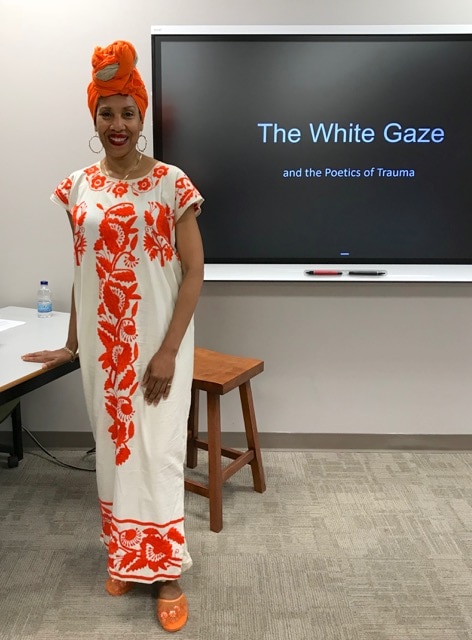There will be nourishment somehow (everything is nourishment somehow or another).
“To Begin With, the Sweet Grass”
— Mary Oliver

We’d spent the day at the Black Loyalist Heritage Centre in Birchtown (near Shelburne). There, we’d learned about the plight of the first large group of free Blacks in North America; a group ultimately so demoralized by the racism they’d endured in Nova Scotia that, in 1792, they boarded a ship and returned to Africa. In doing so, they rendered themselves vulnerable, anew, to a flourishing slave trade that was not abolished by the British Empire until 1883.
While at the Centre, we also attended a presentation by the celebrated Black artist/scholar Quanda Johnson in which she chronicled the denigration of, as she put it, “human beings packaged in Black bodies.” Resplendent in a bright orange head wrap, an Africa-inspired dress trimmed in orange embrodiery and orange slippers, she also shared painful memories of blood kin who’d decried her natural beauty as “unattractive.”
En route home, my partner and I passed a restaurant in an increasingly trendy district of Halifax. Seated at a table adjacent to the eatery’s large plate glass window, we spotted a group of white women who began to wave, eagerly, and to gesticulate, happily, in our direction. Some we knew as friends, others recently met acquaintances, most were unknown (at least) to me. We paused briefly in front of the window, smiled at the cheery women and returned their waves. My partner asked if I wanted to go inside.
Enriched but also enervated by my sojourn at Birchtown (where visitors can view underground pits that Black Loyalists, denied promised housing, were compelled to “live”), I declined and we kept walking.
Still, the plate glass window interlude stayed with me. Indeed, I mulled it over for most of the night. The full sweep of my thoughts on the matter have yet to unfold. But I believe that everything happens for a reason; that in a province burdened with horrific racial strife, the stark shadow of a pit “house” against the recent burst of hipster eateries in Halifax is worthy of examination. There is merit in the enterprise.
Ditto for those of every hue with the courage to “go inside” (literally and figuratively) and experience Birchtown, indisputably one of the most important cultural sites in the country. There, one is called to remember that Nova Scotia claims in triumph Black Loyalist descendant Corrine Sparks ( the first Black woman judge in the nation) and in tragedy (sadly, the cup runneth over), the longest-standing Black population in Canada.
For now, I meditate on Johnson’s superb presentation, “The White Gaze and the Poetics of Trauma.” “You could have been anywhere on a Saturday afternoon,” she told the rapt, multi-racial audience. “But you chose to be here. So I celebrate you as citizen activists.”
The self-loving lyricism of author Zora Neale Hurston also offers perspective on my stroll by the restaurant: “Even in the helter-skelter skirmish that is my life, I have seen that the world is to the strong, regardless of a little pigmentation, more or less. No, I do not weep at the world — I am too busy sharpening my oyster knife.”
Quanda Johnson will repeat her presentation at 2 pm. on Tuesday, July 24 as part of Africville Reunion events taking place at Africville Park in Halifax. “Everyone is welcome to help us celebrate and participate in all activities,” said an official.
If you can, please support the Nova Scotia Advocate so that it can continue to cover issues such as poverty, racism, exclusion, workers’ rights and the environment in Nova Scotia. A paywall is not an option for us, since it would exclude many readers who don’t have any disposable income at all. We rely entirely on the kindness of occasional one-time donors and a small group of loyal monthly sustainers.



